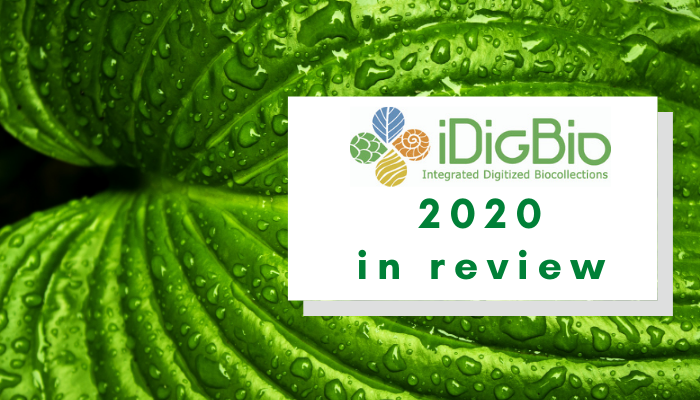
Dear iDigBio Enthusiasts,
I am delighted to report that iDigBio enjoyed an exceptionally successful and productive 2020 made possible in large part by contributions of the many collaborators whose consistent support, involvement, and input have been highly valued and much appreciated. We enter the new year eager to continue integral involvement in the biodiversity collections community.
Following several in-person January and February events to jumpstart the year, including the second annual iDigTrio conference, we rapidly shifted our focus to enhancing and expanding virtual platforms, activities, and techniques. Highlights of our conversion to virtual include the late April Georeferencing for Paleo Workshop, the first virtual Digital Data in Biodiversity Research Conference, a virtual symposium presented to the Smithsonian National Museum of Natural History, the 6-part Adapting to COVID-19: Resources for Natural History Collections in a New Virtual World webinar series co-sponsored with SPNHC, and active mentoring and presentations for the annual SACNAS conference. The digital data conference attracted about 600 participants, three times as many as previous years, and provided numerous lessons that were applied to September’s successful 2020 ADBC Summit. The Summit’s 263 attendees more than doubled previous numbers. These virtual activities have significantly increased opportunities for professional engagement by collections community professionals.
Another important achievement from 2020 is the update of iDigBio’s collections registry to sync with that of GBIF. Thanks to leadership from the GBIF staff and iDigBio’s biodiversity informatics and cyberinfrastructure teams, iDigBio’s collections page now loads directly from the GBIF registry and refreshes each time it is opened, ensuring that the most recent data are displayed. Clicking the Search Recordset(s) link retrieves the data available in iDigBio from that collection. Blank recordset references indicate collections that have yet to contribute data to iDigBio, making it easy for iDigBio staff to follow up.
2020 was also a year in which iDigBio reinforced its commitment to diversity, inclusion, equity, and accessibility. The Education, Outreach, Diversity, and Inclusion team developed and revised iDigBio’s Code of Conduct applicable to in-person and virtual events, co-organized a STEM Inclusive Teaching Practices webinar series with EDSIN, QUBES and BLUE, and increased our participation in the SACNAS National Diversity in STEM conference though organizing a bioblitz, biology careers symposium, and serving as mentors for conference participants. We also refined plans for student engagement at the 2021 Digital Data conference and put in place an NSF-funded internship initiative for historically underrepresented undergraduate students at the Florida Museum that in future years will be expanded to other museums throughout the United States.
With leadership and collaboration from BCoN and in conjunction GBIF, ALA, DiSSCo, the alliance for biodiversity knowledge, and iDigBio’s global communications team, iDigBio has continued to move steadily toward its international goals. We are delighted to be participating heavily in a community consultation focused on converging the digital and extended specimen concepts and enhancing global access to biodiversity data. The consultation will begin in February 2021 with topics that include:
-
Digitizing/mobilizing FAIR data for specimens,
-
Extending, enriching, and integrating data,
-
Annotating specimens and related data,
-
Crediting and attributing tasks like data and material curation, and
-
Analyzing/mining specimen data for novel applications.
Best Regards,
Gil Nelson
Director of iDigBio
Florida Museum of Natural History
University of Florida







